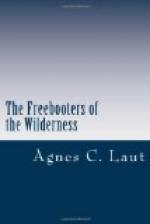the windfall and burn; and now, the deity of the woods,
Nature, was at work! By the moonlight, the Ranger
could see the pale chalky peach-bloom boles of the
ghost birches, and the satiny poplars and cottonwoods,
turning gold to the approaching autumn but going down
gay, twinkling, laughing fellows to the year’s
death, actually clapping their hands, shaking with
glee, sending leaves down in a rain of gold, which,
it is to be hoped, the pixies picked up, the pixies
sailing the air in feather parachutes of flower and
cone seed! Wayland could see these airy ships
between him and the silver moonlight, dropping seeds—seeds—seeds;
seeds of fire flower and golden rod and hoary evergreen;
shooting them out in tiny catapults; sending them
up in dandelion fluff and sky rockets; catching and
skimming the wind in airy canoes; tilting the winged
sails to a whiff and sailing, sailing, dropping the
seeds of life for a thousand years! And beneath
the birches with the hundred eyes looking out from
the chalky faced bark, and the poplars laughing and
shaking with glee, and the cottonwoods showering down
a rain of gold in their death; stood the little pines
seeded by the wind, nursed by the shade of the quick
growing trees. Who would be living and loving
and fighting and hating and winning and losing when
these little fellows rose to toss and flaunt their
victory in the face of the sky? Was that the
meaning of life after all, the strength and thew,
the valor and might of the fight up? Then, it
was not such a bad way with the Nation. The Nation
would be the better for this fight. Certain,
it was, the better side would win. Would it
be the few like the sugar pine towering over its fellows;
or the many like the lodge pole pine and englemann
spruce standing in serried ranks of equal valor and
power?
And if you think he could take that ride without wishing
to the “nth” degree that she could be
with him to share the joy, then, I assure you, you
don’t know to what music those gay, twinkling,
trembling gold leaves above the Brule were
beating time all night to the whisper of the wind
and rustle of the pixy parachutes sailing mid-air.
CHAPTER XXV
THE QUESTION IS—WHICH UNCLE SAM?
Before, it had been a race-reverie; a waiting, puzzled
and uncertain for the ways of life. Now, it
was the joy of life, the fulfilment for which life
had been created and waited expectant; and whether
the ways were any plainer in the new light, there
was no room for wonder in the fulness of joy.
Eleanor was glad the little bundle of tawdry loquacity
toddling between them kept up a constant stream of
idle boastings on the road to the Mission House, about
being “waal-thy” and “Faather shure
bein’ a gen’leman when they were waal-thy”
and “herself as foine as eny loidy in th’
land,” and more and more of the same, all the
way down the Ridge Trail; which was not so fatuous
as it sounded, when it voiced the convictions of a
great many more people than the little unwashed garlicky
Shanty Town dancer. Eleanor wondered if the same
arguments applied to the culture of horses and pigs
and potatoes—size instead of sort, fulness
of stomach not quality of head, area of possession
not area of service.




